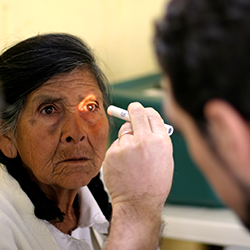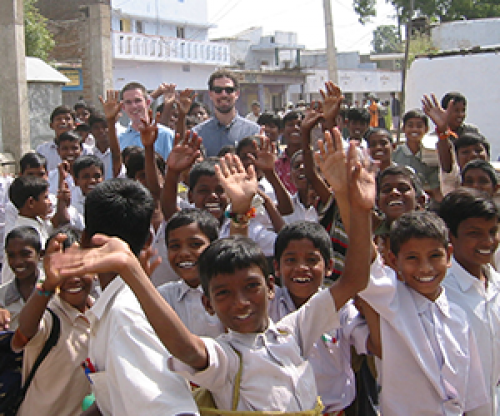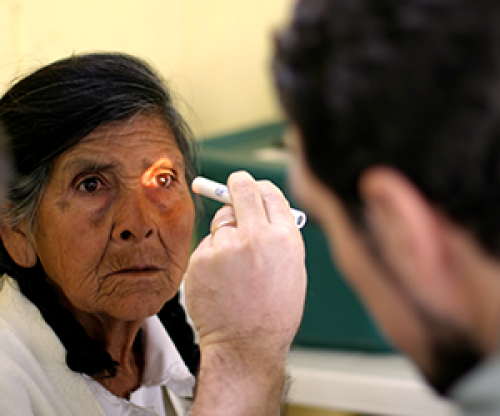"Seeing" a Better Future
Henry Crown Fellow Jordan Kassalow is helping thousands across the world realize their full human potential through VisionSpring, an organization that provides affordable eyeglasses, and EYElliance, a partnership that improves accessibility to eye care via institutional reform.
AGLN: Why is improving vision important and what are you doing to address it?
JORDAN KASSALOW: Vision is an incredibly important input to development, whether it’s human, personal development, capacity development, or economic development. Quite simply, if you can’t see you can’t learn, if you can’t see you can’t work, if you can’t see it’s hard to be safe in the world and live up to your full human potential.
We’re trying to tackle this in a couple different ways. At VisionSpring we are trying to attack it from an enterprise approach, creating a business, a social responsible business that provides affordable eye care to underserved populations throughout the developing world. We’re also trying to solve it at a systems level through a new organization that we’ve founded called the EYElliance. And this is really taking a systems change approach – bringing government, private sector, and civil society together – to raise this issue area on the global development agenda and make it a more prominent issue on the agenda.
AGLN: How do you know your model is effective?
JK: The social enterprise model is effective in the markets we work because there are market mechanisms that can ensure sustainability. However, we are also working with new markets and people who haven’t had access to those products so we can’t take a full-on private sector approach. Sometimes we need to subsidize our models with philanthropic capital and the way we know they work is because when we started we sold 800 pairs of glasses in our first year and last year we sold 900,041 glasses.
With systems change work it’s harder to know whether the model is working because systems change takes much longer than enterprise change. Systems change is changing policy, systems change is changing behavior and attitudes, and that by definition takes longer. But one way to measure if systems change is working, is what kind of policies are being enacted that are pro development and in our case pro-vision? Are ministries of education changing policies to incorporate eye health into school health? Are transportation ministries incorporating policies that ensure anyone who is getting a motor vehicle license is getting an eye exam? Are there policies within factories that make sure that if their workers are working 10 hours a day with their eyes and hands that they have proper vision screening and access to affordable glasses to do the work that they do?
AGLN: Who are the primary clients you serve?
JK: At VisionSpring we have two primary clients. We call them our learners and earners. Learners are children who are living in countries where the average person earns between $1 and $4 a day. Then we also have our earners strategy, people who are using their eyes in order to earn their income, whether they be weavers, or artisans, or barbers, or mechanics, and the list goes on. And so those are our customers, learners and earners, in societies where the average person earns less than $1 to $4 per day.
With the EYElliance, the objective is similar to VisionSpring, is to make glasses more affordable and more available to people who live on $1 to $4 a day. But the point of leverage isn’t at the customer level, as much as it is at the government level, moving government policies, getting companies to recognize that there’s actually a way to create businesses that can reach further down into the base of the pyramid that can be profitable and in fact that represents huge potential market growth for those companies. So there we’re trying to push private sector and government to address this issue area.
AGLN: How do you scale your impact?
JK: At VisionSpring we plan to scale our impact by continuing to develop our models and work through more partners. We have two very broad strategies. One is distributing our products through partners and the other is having proprietary VisionSpring owned channels. The partnership channel is where 70% of our sales come from, so that’s where we’re putting most of our effort is to expand the partnership model.
With the EYElliance the scale looks even bigger than VisionSpring because it’s going to be a collection of industry players. It’s going to be a collection of sectors that will be getting involved with the work. So we as a collective have the aspiration of reaching 100 million people through the EYElliance.
AGLN: What impact would you like to see by 2030?
JK: I want the world in 2030 to be more just than it is today. I want to make sure that every boy and girl, man and woman who needs to see to live up to their human potential has the ability to do so. And I think I can play a key role in bringing the justice of vision to millions of those people through the skills that I’ve learned at the Aspen Institute and through my friends at the Aspen Global Leadership Network.
Other Recent Posts
The final day of the 2019 Resnick Aspen Action Forum closed with a celebration of intergenerational perspectives that included presentations from young leaders and a discussion between AGLN Moderator and South African Fellow Heather Sonn and Keith Berwick, long-time friend and founding executive director of the Henry Crown Fellowship. ...
When Anousheh Ansari was seven years old, she drew a photo of a rocket flying through space and set her eyes on exploring outer space being astronaut. There was no space program in Iran at the time and the chances of Ansari becoming an astronaut were slim. “I like to prove people wrong,” said Anousheh Ansari on stage at the 2019 Resnick Aspen Action Forum. On ...
The 2019 John P. McNulty Prize laureates, five extraordinary individuals, shared their courageous and bold social impact ventures at the Resnick Aspen Action Forum on Wednesday night. McNulty Foundation President Anne Welsh McNulty, who founded the award in honor of her late husband, described the McNulty Prize as a call to action. “You have shown ...
Borders are a part of life –– whether internal, invisible, geo-political or otherwise. Borders can help and they can harm. Borders are powerful and they can also be a form of power. Understanding the borders that are around and within us can lead to greater self-awareness and open the path for making great change in the world. With inspiration from the ...
1. Draw inspiration from other participants Over 1,000 Action Pledges have been made since the inaugural Action Forum in 2013. Watch the video below on some highlighted Action Pledges. 2. Find your sweet spot The most exciting Action Pledges come from what we call your sweet spot, the intersection of your passions, talents, and your community’s ...




Leave a Comment